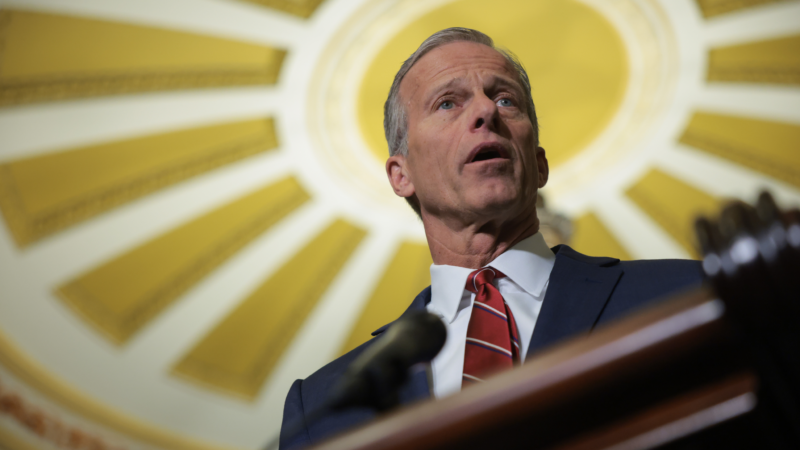Senate Republicans move forward with their budget plan to promote Trump’s agenda
Senate Republicans have unveiled their proposed policy and budget package, setting up a fight with members of their own party and their House counterparts in a race to implement a key piece of President Trump’s legislative agenda.
Sen. Lindsey Graham, R-S.C., chairman of the Senate Budget Committee, released the 70-page Senate budget resolution text on Wednesday. Senators expect to start voting on the sweeping legislation by this weekend.
It would raise the country’s debt limit by $5 trillion to avoid a catastrophic financial default this summer, and make tax cuts that passed under Trump’s first term permanent. The House-passed $4.5 trillion Trump tax plan is included in the package.
“Today is one of the most important steps toward ensuring the Republican majority fulfills its promise to the American people that we will secure our border, strengthen our national security, make President Trump’s tax cuts permanent, and reduce spending,” Graham said in a statement.
If approved, the multitrillion-dollar plan could become a hallmark of Trump’s second term, reimagining the U.S. budget through defense, energy, immigration, and tax policy.
Senate Majority Leader John Thune, R-S.D., said the legislation would pave the way for “generational investment” in border security, national defense and the energy sector.
“Republicans in the Senate and the House are committed to working with President Trump to stop Democrats from imposing an automatic $4 trillion tax hike on the American people at the end of this year,” Thune said of the extension of the Trump tax cuts.
Thune said the plan also aims to reduce the size and scope of the federal government.
Earlier this year, Senate Republicans, impatient with delays tied to intraparty divisions in the lower chamber, jumped ahead of their GOP House counterparts in crafting the package. That’s left House Republicans, with a much tighter margin for their majority, worried the Senate version may lose support.
Senate Republicans crafted a resolution with some flexibility on spending cuts, but that could still face problems in the House, where a group of conservatives want to push for a higher figure.
Earlier this week South Carolina Republican Rep. Ralph Norman, asked about supporting a Senate resolution with a range of spending cuts, told reporters, “To me it’s dead on arrival.”
On the amount of cuts, he said, “It’s gotta be the $2 trillion — we have to be on lockstep with that.” Norman also said he opposed the $5 trillion increase in the debt ceiling, telling reporters, “I had trouble with 4 [trillion]. I went along with that [for the House budget reconciliation plan in February].”
To avoid a filibuster in the Senate and pass new policy, Republicans are using a feature of the budget process called reconciliation. The provisions that they include must have a substantial impact on the budget in order to be eligible for the simple majority vote.
However, even if they pass this resolution, there will be several procedural hurdles between now and when they could potentially pass any new policies.
Regardless, Thune on Wednesday said he was hopeful Republicans would be able to move ahead.
“The Senate parliamentarian has reviewed the Budget Committee’s substitute amendment and deemed it appropriate for consideration under the Budget Act,” Thune said. “It is now time for the Senate to move forward with this budget resolution in order to further advance our shared Republican agenda in Congress.”
Senate Minority Leader Chuck Schumer, like other Democrats, slammed the proposal, claiming it will trigger major cuts.
“As Americans start to feel the pain from the brazen Republican cuts, Republicans are running full speed ahead to pass their plan to gut vital programs, throw Americans off Medicaid, to give massive tax breaks to billionaires,” he said in a statement.
NPR congressional correspondent Deirdre Walsh contributed to this report.
Recent attacks have been ‘inspired’ by Islamic State. What does that mean?
A decade ago, the self-proclaimed Islamic State group held vast swaths of territory across Iraq and Syria, but President Trump declared it destroyed in 2019.
Sixpence None the Richer: Tiny Desk Concert
So much of the holiday season is about finding a balance between bright lights and dark nights. Sixpence None the Richer's music finds depth in the in-between.
Thousands of guns are found at crime scenes. What do they tell us?
A report from the advocacy group Everytown For Gun Safety analyzed data from local police departments on nearly 350,000 guns used in crimes from 2020 to 2024, including where they came from.
Trump’s economic approval hits a new low at 36%, poll finds
A new NPR/PBS News/Marist poll finds 70% of Americans say things have become too unaffordable and have a dim outlook on the economy and President Trump's handling of it.
How the long-running Obamacare fight came to thwart enhanced subsidies in Congress
Congress is poised to leave for a scheduled holiday recess without a solution for addressing the expiration of enhanced subsidies for Affordable Care Act marketplace plans.
From bird droppings to holiday kisses: How we ended up under the mistletoe
The etymology of mistletoe — a plant with small, oval evergreen leaves and waxy white berries — may strike some as repugnant.







